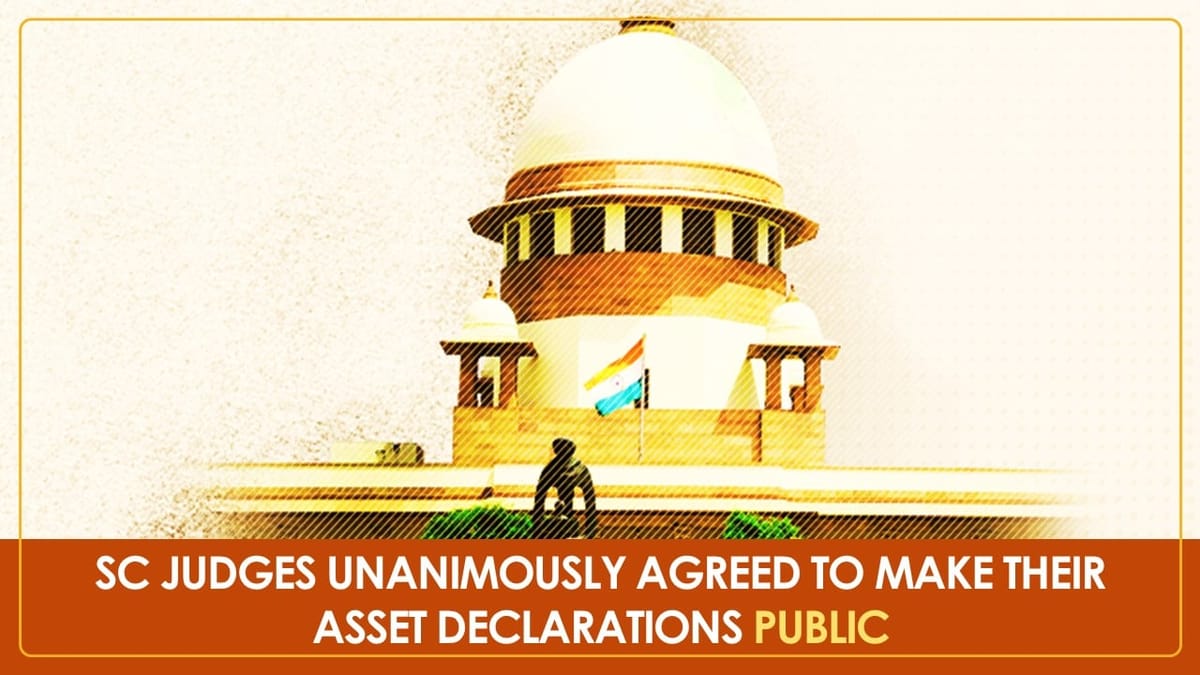All 33 sitting judges of the Supreme Court have unanimously decided to publicly reveal their assets by publishing the information on the supreme court's official website.
Reetu | Apr 3, 2025 |

BREAKING: Supreme Court Judges unanimously agreed to make their Asset Declarations Public
All 33 sitting judges of the Supreme Court have unanimously decided to publicly reveal their assets by publishing the information on the supreme court’s official website, a significant step towards more transparency in the Indian judiciary. The decision, made at a full court meeting on April 1, is a significant departure from previous practice, in which asset statements were left to the discretion of the judges.
The resolution, which applies to both existing and future judges, comes amid mounting worries about the judiciary’s impartiality. Recent issues, most notably the alleged finding of a huge sum of cash at Justice Yashwant Varma’s apartment last month while he was serving as a judge in the Delhi High Court, have highlighted the need for greater accountability. Justice Varma is currently facing an internal investigation and has been sent to his parent high court in Allahabad.
The Supreme Court’s decision to require public disclosure is viewed as a step towards re-establishing public trust in judicial integrity.
The debate about judges asset disclosure has lasted decades. In 1997, the Supreme Court passed a resolution known as “The Restatement of Values of Judicial Life,” which obliged all Supreme Court judges to reveal their assets and liabilities to the Chief Justice of India (CJI).
High court judges are required to report details about their assets to the chief justices of their respective high courts. This declaration had to be made upon appointment and updated on a yearly basis. However, this internal procedure did not apply to public disclosure.
In 2009, in response to public scrutiny, the Supreme Court’s full bench decided to allow justices to disclose their assets voluntarily. On September 8, 2009, the Supreme Court reaffirmed that while justices were encouraged to report their assets publicly, it was not mandatory. Even today, the Supreme Court website notes that asset disclosure is voluntary, with 30 of 33 judges having made declarations.
The Right to Information (RTI) Act, passed in 2005, fuelled discussions about judicial transparency. While RTI permits citizens to request information from public agencies, Section 8(1)(j) of the Act prohibits the revealing of personal information unless it serves the greater public interest. This provision has frequently been used to prevent access to judicial asset declarations.
One of the most notable judicial battles on this topic was started by activist Subhash Chandra Agarwal, who filed an RTI application in 2009 requesting the disclosure of Supreme Court judges’ wealth declarations. The Central Information Commission (CIC) ordered the Supreme Court to provide information, but the judiciary refused, citing privacy concerns.
In Secretary General, Supreme Court of India Vs Subhash Chandra Agarwal (2010), the Supreme Court ruled that, while judges are required to report their assets to the CJI, such information would not be made public unless there is a compelling public interest. This concept was confirmed in 2019 when a five-judge Constitution panel held that asset information could stay private unless the public interest required publication.
Despite past court rulings that protected anonymity, the subject of judicial asset disclosure has remained contentious. The lack of mandated public disclosure has sparked criticism, notably in comparison to elected officials and bureaucrats, who are compelled by law to make their asset declarations public.
In its 2023 report on judicial accountability, the Parliamentary Standing Committee on Law and Justice proposed that judges make required public declarations, but no legislative action was taken. In November 2024, the government notified the Rajya Sabha that there are no plans to make asset reporting mandatory for Supreme Court and High Court justices.
The government recently answered a query in the Rajya Sabha by RJD MP Manoj Kumar Jha about obligatory asset reporting for judges. Arjun Ram Meghwal, Minister of State for Law and Justice, indicated on March 27 that the Supreme Court examined the issue through a committee of judges and found that the current system of voluntary disclosure is consistent with court precedent.
The committee referred to the 2019 Constitution bench decision, which upheld the confidentiality of judicial asset statements unless the public interest requires disclosure. The committee reaffirmed the longstanding practice of requiring judges to report their assets to the CJI upon taking office and after every significant acquisition, with the names of compliant judges publicised on the court’s website.
Furthermore, the government clarified that, while the Parliamentary Committee on Law and Justice recommended mandatory asset declaration for judges in 2023, no statutory rules to enforce such a requirement have been framed under the High Court Judges Act of 1954 and the Supreme Court Judges Act of 1958, respectively. The judiciary is responsible for keeping asset disclosure records, and there is no central repository for such data, it noted.
In case of any Doubt regarding Membership you can mail us at [email protected]
Join Studycafe's WhatsApp Group or Telegram Channel for Latest Updates on Government Job, Sarkari Naukri, Private Jobs, Income Tax, GST, Companies Act, Judgements and CA, CS, ICWA, and MUCH MORE!"